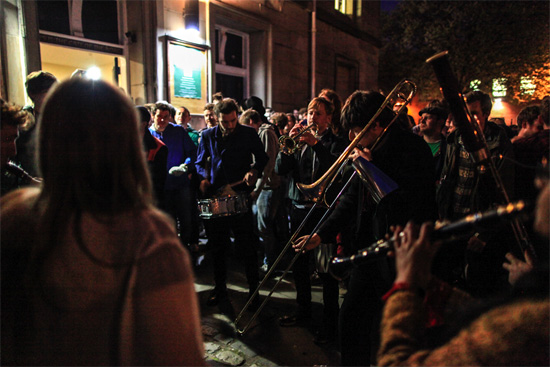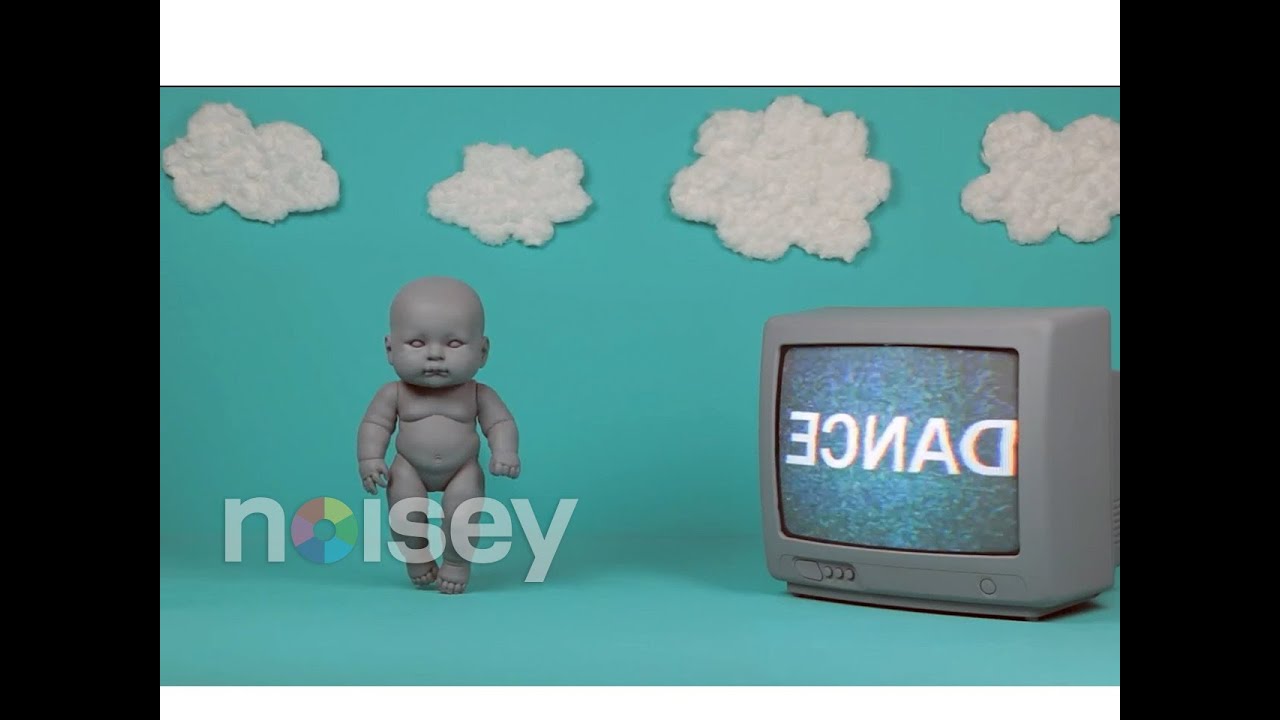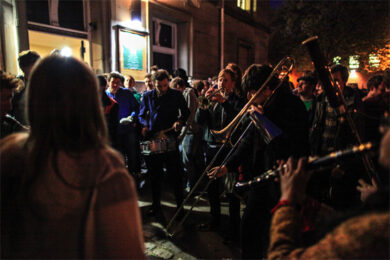Photos by Magnus Aske
Sounds From The Other City is Salford’s multi-venue, multi-promoter all-day music festival. Started in 2005 by the same people who converted the area’s old cotton mill, Islington Mill, into a multi-purpose arts space and residential community, the event has grown thanks to the organisers putting trust in good promoters to book the line-up, leaving themselves to provide a community inclusive atmosphere. It’s built atop a foundation of DIY ethics, with the money coming in from ticket sales being, by and large, all the money that comes in full stop. I’ve been a punter at the event since 2009, a writer since 2010, and I curated and ran a stage for it in 2012; this year I volunteered to work there. Here are some of the things the Quietus learned…
A diverse day is assured whether you’re a promoter…
At Sounds From The Other City 2012 I was asked to curate a stage under my Grey Lantern promoting moniker, confining my experience of that year’s whole event to one sweltering pub called the Black Lion. I arrived at the venue at around 10am and left at 2am the next morning, with eight live acts, sound engineers, and a good few hundred people having passed through in between.
On a day where I gradually became more perspiration than man, the main issues included the following. Trying to avoid going toe to toe with the establishment’s local drinkers as I asked them to vacate their table – Walls’ Sam Willis needed one tall enough so that he wouldn’t put his back out reaching down to play (promoters take note: Walls specify their required table dimensions for a reason). Helping Eaux get a wall of flight cases up three flights of steps and through a fire door. Realising, as night fell, that some of the budget I’d been given should possibly have been spent on hiring some stage lights, as two of the last three acts played in pitch black but for their visuals – we had to find a lamp so Dam Mantle could see his laptop, and in the end the atmosphere actually sort of worked. Trying to make somewhat intense and nervous four-piece Embers – it was their debut show – understand that a two hour sound check wasn’t really an option when there were seven others also playing.
Sounds From The Other City is a great leveller for promoters, a rare time when those used to booking the names you see on nationally-known websites and hear on Radio 6 are limited to the same privileges as their smaller brethren, who fill up the region’s upstairs bars and downstairs basements with raw native Mancunian acts a couple of times a month. Champions of the fashionable and popular, Now Wave and Hey Manchester!, take the largest spots on offer this year: the hushed decorum of the nineteenth century St. Phillips Church and the anything-but industrial-pillared climbs of the aforementioned Islington Mill. However, though they provide today’s undoubted headliners in the likes of Daedalus, Deptford Goth, Stealing Sheep and Still Corners, the rest of their respective bills are more modest – in keeping with the strict pre-determined budget they’d been given.
The festival’s DIY way of running things means it lacks the big budget of the weekend’s other big Northern all-dayer, Live At Leeds. As such, the best moments are often found with promoters who usually work in the ever intriguing margins of the city’s live scene. Self-styled "dirty basement disco for Fags, Feminists & their fucked up friends" Trash-O-Rama are at the Angel. Normally a healthy living centre, there’s not much of that in evidence today, and even the venue itself is decidedly worse for wear once the Trash-O-Rama line-up is done with it tonight. Among their selections are Die Hexen and Laser Dream Eyes, two of the region’s more gothic-inspired offerings; the former’s music draws for pagan mantra and sultry dark synth-pop, the latter their own fizzing take on the hissing fission of Suicide. Elsewhere, Fat Out Till You Pass Out, who we recently wrote about, are teaming up with south Manchester-based Bad Uncle at the Salford Arms (a pub as endearingly uncompromising as its name sounds, right down to the 1970s carpeting) to partner up existing acts and ask them to craft either improvised soundtracks or homage, in the case of several musicians who perform Pink Floyd’s ‘Echoes’ to a packed room.
For the curators, it’s about getting the most that they can out of the strict boundaries they’ve been set – and it’s often all the better for it, with the onus on invention and spark of idea, rather than the ‘book them and they will come’ approach of more moneyed rival events. Manchester Scenewipe host a ‘SceneSkype’ stage, for instance, which sees live performances from around the globe by the likes of Oxbow, D/R/U/G/S and Swans’ Jarboe, transmitted onto the walls of their space in Islington Mill’s second room. They follow this with a ‘Chat Roulette disco’ – we’ll get to that later. Local label Red Deer Club, meanwhile, has a mysterious ‘guide’ who turns up on Chapel Street’s Bexley Square at specified times, whisking people off to secret performances at hidden locations. I’d quite fancied going to one of those but…
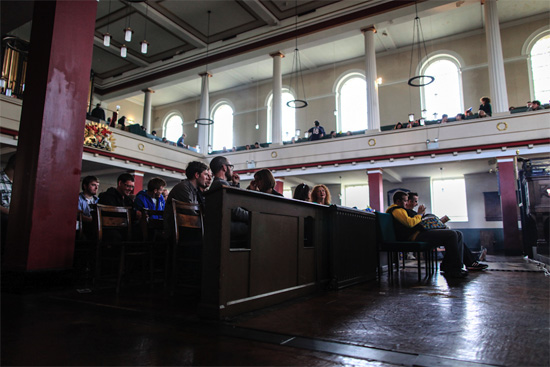
…a volunteer…
A chunk of my Sounds From The Other City this year is spent volunteering, my post seeing me checking wristbands outside a four hour-long improvised set being put on by Baptists & Bootleggers. They’re a label with a penchant for amorphous drones, sustained ambience and ideas stretched through a long form prism. Yet, with a revolving cast of musicians joining them throughout the day, their performance progresses in a manner quite apart from the sonic offerings they’re currently releasing. Bags over their heads and then glasses over those bags, Horrid are anything but, offering the sort of stoned-out motorik dissonance that made The Quietus so adore regional contemporaries Gnod’s Chaudelande earlier in the year (that group are here too, somewhere, showcasing their abrasive forays into industrial and noise, with a stomach-steeling 5 hour showcase of their new label Tesla Tapes.)
It’s when Baptists & Bootleggers founders Yes Blythe and James Moffat take over, though, and the percussion fades away to be replaced by a wavering but constant line of pedal-driven tension that things go truly off-piste. Then the folks who manage the venue that we’re in start to get twitchy. "If we had a Stone Roses CD on we’d have a full bar," one of them grumbles, proving that old stereotypes die hard. He’s relatively sober and just about holding his nerve at this point, but it’s clear he’d not been foretold about the nature of today’s performance. As the drones cascade on one another, so does the whiskey down his throat. His eyes harden, the complaints becoming more boisterous. "Explain to me what this is," he asks some passers-by; "spare me, please," he groans at another.
Moffat, armed with a guitar and enough loop and echo effects to give the impression that he’s controlling the whims of a building hurricane, is gradually whipping and teasing his unbroken chain of sound deftly through calm and turbulence. It works well, but our boozy friend looks like he’s about to throw a proper avant-mard, so when a drum troupe appears outdoors on the paved square adjacent to our building, it’s a somewhat timely respite. Dressed for what would’ve been a nothing if not admirably bold mass S&M orgy in the bright daylight, it’s with a mixture of relief and disappointment that the 30 strong percussion outfit drill their way through a fifteen-minute performance instead. Such apparent spontaneity is par for the course at Sounds From The Other City: later on in the night, further up the road, outside St Phillip’s Church, a series of brass and wind players emerge from night’s dark to lead the gathered throng in a merry, if not always co-ordinated, song and dance. These are not high-art pieces and, as with most aspects of the festival, they’re relatively low budget. Yet they’re effective, diverting, constantly giving the audience something different to take in even as they walk from venue to venue (the drummers pop up again before Daedalus’ headlining set at Islington Mill later on.)
Three hours into the improv piece and Ill have taken reins, changing the arc of the music completely. Where it had previously settled into a pooling mesh of felt out nuances, now it comes on strong, the band initially rattling their way through something akin to the Imperial Death March, though imagined through the ears of a group who’d only ever been told what it sounded like in Star Wars. Occasionally they break off to shout out stream-of-consciousness chants, pirouette around the room and generally lose themselves in the jerking, disparate cacophony of their own creation. It finally becomes too-much for our now inebriated hosts, particularly when the performing numbers reduce to just one, attempting to cause feedback from a cymbal lying on the floor. They’re told to stop.
…or a punter
The first time I saw Dutch Uncles was at Sounds From The Other City; the first time I saw both Chrome Hoof and Gnod was here too. Each year, while the big festivals are critiqued based on just the headlining handful of the hundreds of acts they’ve booked to play, the events that truly thrive are those that take a chance on the bill as a whole. They tap into the persistent truth that all it takes is a first sighting of someone live to fall in love with them. Great festivals are about the experience as a whole, and by entrusting each promoter with complete control over who they book, Sounds From The Other City allows for complete unpredictability and frequent discovery.
Gramme are somewhat of a curio: they debuted in the late 90s as a post-punk leaning band, though amidst the rumbustiousness of their 1999 release Pre Release, there already lurked the sort of funk-filled bass lines and trans-Atlantic disco rhythms that anticipated the likes of DFA Records and Hot Chip a good few years later. Quiet for a decade and more, they returned with new record Fascination this year, and live at The Old Pint Pot they’re in keeping with their new LP’s sleak, feverish club-night jams, the abrasion evident in their younger selves melting away to reveal taut, flexible party nuggets. After a slow burning afternoon at the Pint Pot, where DJs have been forced to contend with locals watching the football, Gramme bring the pub alive, transporting Salford to Brooklyn.
Queer’d Science can literally bring the ceiling down
Gramme were on course for making the biggest impression of the day, if it hadn’t been for a super-charged performance from probably Manchester’s best current live band, Queer’d Science. As with all vital three-pieces, each member of the group is intrinsically captivating in their own right – whether it’s drummer Del Morley howling at his body to drive ever faster through the trio’s powder keg blasts of noise rock; the unmoving, sullen stare of guitarist Dom Bojanic-Tanner, as his robotic guitar lines cause draw in the claustrophobic chaos around him; or vocalist Vendela Engstrom, who leaps around like a firecracker, inciting a packed audience in the Angel Centre towards similar limb unshackling.
The low ceiling of this makeshift venue hasn’t been designed with crowd surfing in mind, and about halfway through Queer’d Science’s blistering set it crumbles as a rabid Engstrom is hoisted up towards it by the wide-eyed crowd. It’s fight or flight for the Swede, still barking psychotically down her microphone, but with a hefty couple of kicks she buys herself some breathing space. The ceiling tiles crash to the ground and break over the audience, with the stunned faces of the venue’s management illustrating just how incongruous this perfect mural of a punk scene is in their usually calm space – they normally practice yoga in here, one presumes. Tonight is a triumph for Queer’d Science; the feel of their set is different from performances last year, during which they raged and thundered in order to provoke. The crowd are on their side these days.
Chat Roulette still offers a portal into some of the most warped minds on earth
Kermit the frog appears on screen holding a tube of lubricant before pleasuring himself. A man sits naked and – upon being cheered – stands up and tries to insert a beer bottle somewhere where it certainly isn’t likely to remain chilled. Welcome to the Manchester Scenewipe Chat Roulette Disco. It’s a simple concept: Chat Roulette, a site where you log in and take pot luck at conversing over webcam with another user at random, has long become a graveyard for the twisted souls of the night who revel in the knowledge that a stranger could be watching them jerk off. Projected onto a big screen in a Salford mill means they’ve all got a bigger audience than even their spunkiest dreams ever allowed them to contemplate. At one point there’s well over a hundred people watching these self-pleasuring amateur exhibitionists, while cutting a rug to some staple 80’s disco classics – it’s enough to make you wonder whether it’s the guy putting clothes pegs on his nipples on-screen, or the dozens of people goading him on, who are the weirder party.
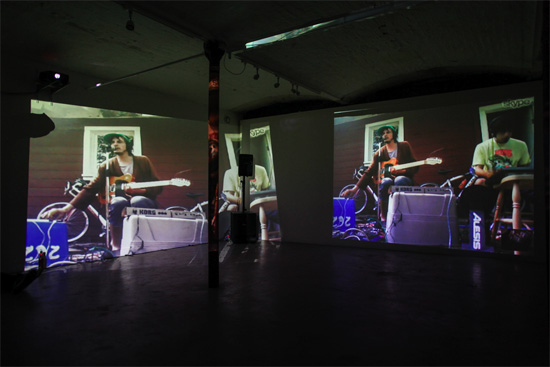
Respect your neighbours
Whatever Salford means to the rest of the country now that the BBC upped and moved sticks to the sleek but soullessly developed Quays, the reality of it is somewhat different, with the city reeling from £23 million worth of recent council budget cuts and subsequently battling unemployment and general decay. Yet where hardship lies within the M60 circular, so true artists and art communities have always risen: from the architectural catastrophe turned creative hive of the Hulme council crescents, to the post-punk wave that toiled during Thatcher’s tenure, through to the acid house that offered an altogether more chemical kind of defiance.
If you split Salford and Manchester, the latter still does have its problems, but the city centre is as modern as they come in this country. The tentacles of regeneration and gentrification have inevitably diluted a lot of the surrounding areas of their clear identity, so that even its considered alternative quarter, the Northern Quarter, has Kahlua-sponsored coffee bars and misogynistically-marketed burger restaurants joining other establishments in coming together to host a street party, on the same day that Salford’s Chapel Street hosts Sounds From The Other City. Maybe it’s just because a couple of the boozers started expanding their ale ranges, but for a recent time Chapel Street felt like a cousin of the Northern Quarter. Islington Mill became more prominent as a gig venue and helped to draw more attention to the area, alongside long-established haunts like the Paul Heaton-owned King’s Arms.
However, with Sounds From The Other City otherwise taking place in a mix of spaces that for most of the year operate as studios, old pubs, community centres and churches, the roots of Chapel Street’s identity are still very much at large. This is despite the fact that great blocks of residential flats have now spring up around it, indicating its close proximity to its much-vaunted neighbouring city. You can compare this area to the Northern Quarter, because the latter is where much of Manchester’s musical infrastructure lies – the bars the musicians work and drink at, the independent venues, the record shops. It remains a special place to have. But on this day, when both areas are out highlighting their area’s own community values, Salford’s would appear to ring truer. There’s a sense of braggadocio in the street party’s dog show, outdoor BBQs and souped-up sound systems – very much the ‘takeover’ they’ve advertised it as. It’s an area that went from being unassumingly great, with its variety of venues and diverse bars, coffee shops and independently run shops, to one that’s starting to cultivate its own myth. Sounds From The Other City is in effect a takeover too, but without the imposition. It sits alongside the routines of its location’s residents without forcing them to adapt to the festival’s own schedule.
Which is why, if you go to the Old Pint Pot, there’s the amusing sight of far-reaching electronic crate-diggers and renowned party starters Wet Play and Faktion furrowing their brows at the decks, while a crowd of regulars sit stoically in front of a TV showing Manchester United vs. Chelsea. It’s also why, if you go to the Deli Lama Café you get the unassuming lunch eaters at one with their normal day, while at the same time the London Sinfonietta-commissioned leftfield composer Ian Vine is testing and probing electronic drones and registers. Sounds From The Other City attracts an international line-up, but crucially it also attracts those who spend the rest of the year living around its temporary home too, making it an all-day event that triumphs in invention, discovery and a hearty dose of community spirit.

